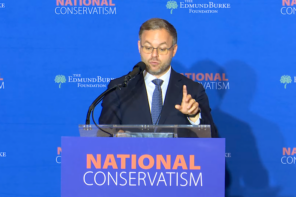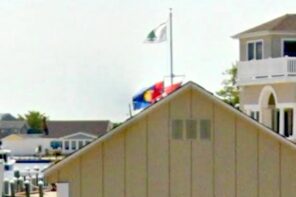“I’m Mohamed, and I used to be an Imam before I lost my faith. I believe admitting it makes me an honest person. Yet every one out there just wanna stone me to death… Why hate?”
“I’m Ahlam, a single, successful career woman. I’m sexy, I live alone, and I won’t apologize for having an exciting life. Misogynists, feel free to bang your heads on the wall.”
Ahlam and Mohamed are fictional characters, undaunted heroes of “The Horrific 4,” a satirical series on the newly launched website, Free Arabs. The series’ other protagonists include Mahmoud (a.k.a. Moody) a gay Arab, and Yehudi, an Israeli Jew. Together with Moody and Ahlam, these are “Satan’s personal envoys to the holy Ummah.” The series, hyberbole and all, is meant to force an urgent debate about uneasy topics in Arab societies.
Free Arabs is the work of Morocco’s ‘enfant terrible,’ Ahmed Benchemsi, former director and publisher of two trailblazing news magazines (Telquel in French and Nichane in Arabic) known for their defiant reporting on politics, culture, and the arts. Benchemsi is the veteran of numerous altercations with Moroccan authorities over his writings on police torture, secret services, the King’s salary, drug cartels, and hot-button issues on religion and Islamist parties. He has been frequently prosecuted and fined—and the newsrooms of his two publications have been closed down.
Free Arabs is, thus, the latest iteration of a long project designed to amplify the voices of a new generation of Arab thinkers, activists, journalists, and artists who dare, against all odds, to flaunt their dissent in the face of weighty cultural norms, meager political and individual rights, and narrow social expectations. The website describes its work as “a unique combination of investigative journalism, trendy reporting, arty activism, and impertinent satire”—all enshrined in the site’s slogan: “Democracy, Secularism, Fun.”
There is no doubt that Free Arabs executes its mission with skill and creativity. Investigative reports cover the war in Syria, human rights violations in Bahrain, stalled political reforms in Morocco, the role of oil-rich Qatar in Tunisian domestic politics, and anti Muslim Brotherhood protests in Egypt. The site’s video section features a subculture of Arab activists who post YouTube videos on free speech and individual liberties in Arab countries. Recent examples included a testimony of a Moroccan atheist who exposes severe apostasy laws in Muslim countries, and an unveiled Saudi female student in Canada who keeps a diary against veiling. And the site’s Art section promotes controversial photo galleries on beauty and veiling, cultural and gender identities in Islam, and the use of humor in the Syrian war frontlines, among other things.
As a critical space, Free Arab should be commended for promoting individual rights and civil liberties in the Arab context. The site’s work is also significant because it tries to locate secularism as a vernacular practice, a lived experience in a part of the world exclusively defined by a narrow religiosity and a perpetual combative relationship with the West.
The founders believe the remarkable political achievements and uncertainties wrought by the recent uprisings in the Arab world have opened up a precious space for an unprecedented public debate. Some Arab media had already paved the way, but as Islamists rose to power in post Arab Spring countries and the grinding civil war lingers in Syria, new fears about the erosion of these critical gains have surfaced, prompting activists, journalists and other social actors to rally around creative projects of social and political change.
As the name of the site indicates, Arabs are, or should be, free to oppose ideological formations which have deprived them of civil rights and kept them captive of an overbearing and despotic political structure. In keeping with the spirit of the Arab Spring, Free Arabs, therefore, proclaims an emancipated form of political and cultural citizenship. The site’s heavy reliance on art and satire to deliver its pungent critique of Islamist politics, cultural norms, and oppressive regimes indicates an emerging form of aesthetic disobedience which seeks aggressively to compete with dominant narratives of Arab identity and dismantle their grip on defining the terms of liberation in the Arab context.
Free Arabs deploys its satirical video series, “The Fatwa Show,” precisely for this purpose. Here, two characters play a misguided imam and his silently obedient disciple. The target of the satire? The vacuous logic of fatwas, or legal pronouncements. Episode titles include: “Contact Lenses: Forbidden!” and the inscrutable, “About Using Carrots.”
The skits are based on real fatwa texts issued by ‘questionable’ scholars. Each video is preceded by a disclaimer that the series does not mock Islam but exposes Muslim clerics “who are prone to criticism.” And the video is then followed by links to the original texts of the fatwas. Obviously, the series intends to critique the absolutism of religious dogmas, but it also invites Arabs to imagine a new language of liberation at a time when religion seems to suffuse emerging political and cultural life.
The same kind of aesthetic disobedience pervades Bassem Youssef’s popular satirical show, “Al Bernameg” (“The Show,” an adaptation of Jon Stewart’s The Daily Show), which has become, since its inception in 2012, a linchpin in the secularist fight against so-called totalitarian Islamist governments and their sympathizers in Egypt and across the Arab world.
As with Free Arabs, a heavy dose of political satire targets Islamist leaders and pokes fun at the religious political elite as it fails to deliver on its pledge to fight corruption and secure social prosperity and cultural renewal. In a sense, and as Middle East scholar Khalil al-Anani argues, the political failures of Islamist parties in post-Arab Spring countries are causing a ‘desacralization’ of their religious and political ideology and diminishing their credibility and symbolic power. “Islamists’ behavior,” al-Anani writes, “has shown that they, like other human beings, are prone to make mistakes and commit sins… while Islamist parties are ascending, their ideology, ‘Islamism,’ is surprisingly descending.”
It’s not that satire is new to the Arab world or that Islamist-bashing is a recent phenomenon. But, the proliferation of this kind of defiance in the wake of the Arab uprisings must be read in a dramatically different light. If there is such a thing as a defining paradigm, or at least an enduring spirit, of the Arab Spring, it has to be the fact that it never was a total revolution or a drastic historical moment with universal political preferences.
The Arab Spring was and still is, as Hamid Dabashi has aptly noted in the context of the 2009 Iranian Green Movement,
“an open-ended revolt, in which not just the ruling regime but also any other regime that may succeed it will remain subject to the expansive unfolding of the public space and the consolidation of social justice from the ground up.”
Islamists are currently feeling the full weight of this ‘expansive unfolding’—and judging from a wave of arrests and intimidation of journalists and satirists, they don’t seem enthused about it. But would post-Arab Spring secularists greet the same unfolding any differently, if they were in power?
This brings us to perhaps an undesired or inevitable consequence of Free Arabs and its claim of a new social and political imaginary. The Arab societies depicted on this site, and to some extent on Youssef’s “Al Bernameg,” are persistently based on a dualistic logic between the forces of Islamism and those of secularism. As Free Arabs’ founder says,
The most relevant, if not the only relevant debate in the Arab world is the debate between secularism and Islamism. It is the one relevant societal line in the Arab world right now… Millions of Arabs are trapped between the reality of their life, the appearances they are supposed to maintain, and the political system meant to enforce those appearances, which is split between plutocracy and theocracy.
Yes, this debate should be welcome, but why should it be the only relevant debate? Why carry on this false binary between Islamism and secularism as the only option? Arab societies are slowly heading into a dramatic and violent showdown, a culture war between Islamists and secularists. And the new public sphere has quickly degenerated into a spectacle of blame and ridicule.
Many people still prefer these labels to define their political and religious sensibilities, but labels have significant historical implications. Here Dabashi’s analysis in the case of Egypt is once again quite instructive:
By calling themselves “secular,” the opposition is in fact granting the [Muslim Brotherhood] an exclusive claim on Islam, which they categorically lack. Islam, Quran, Sharia, al-Azhar, etc. are all false flags raised by the MB to protect their class and ideological interests, thereby manipulating the inner sanctum of millions of Muslim Egyptians for their political purposes, the same (almost identically the same) way that Muslim clergy, led by Ayatollah Khomeini, appropriated the Iranian revolution of 1977–1979 entirely for itself, far beyond their own fair share.
Free Arabs is right to expose religious anti-intellectualism or fight for the rights of atheists in Arab societies, but their defiance would be much more effective if it rose above colonial constructs of secularists versus Muslims or Islamists. Satirizing the latter in the name of Arab secularism risks accentuating this confrontation, precisely as it becomes a lucrative media spectacle animated by television ratings, page views, and advertising revenues.
Satire, as Gogol reminds us, should strive for a corrective prescription amidst the cathartic relief and the stereotypical derision. Humor should not simply give us a fleeting “moment of fun.” It must also deliver us from our social and cultural inhibitions without unduly alienating us. At this significant and tender juncture in Arab history, satire cannot afford to be just an expression of attack—it should also bring us together.
Islamists are not custodians of Islam. But Arab secularists do not necessarily have a more legitimate claim on governance. Holding the feet of both to the fire through purposeful political satire is indeed much needed, but when the purpose of satire stops at a laugh track, it is hard to see much benefit to newly free Arabs.




